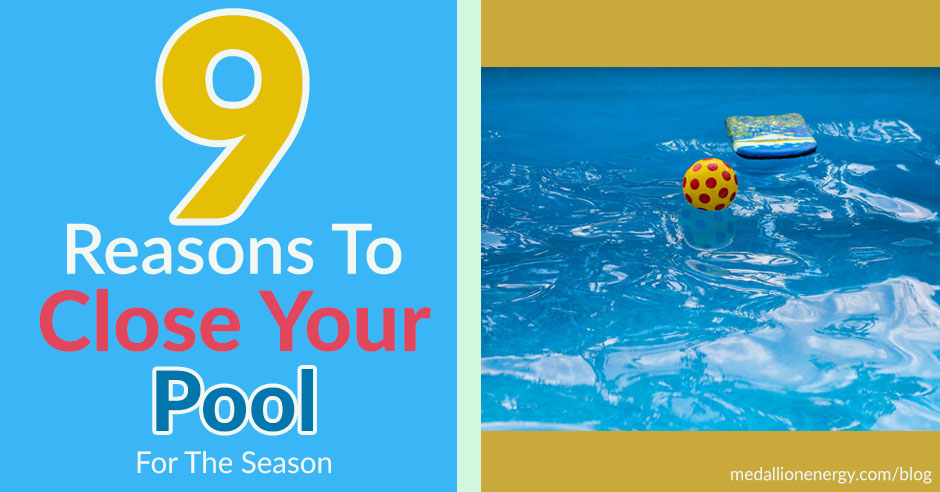Trying to decide whether or not close your pool for the season?
Read this post to help you decide
As the cold weather rolls in, pool season comes to a close for many. If you live in a warmer climate, the season can be a bit a longer. Especially if you’re using a pool heat pump.
But unless you’re living in 60+ degree weather year round, chances are the time will come when closing your pool is the safest decision. And although you can keep it open, both effort and cost are two major factors to consider.
That said. this post is all about why you should close your pool.
Although it may seem counterintuitive, closing your pool saves you time and money in the long run. Keep reading this post to discover 9 reasons to close your pool for the season.
9 Reasons To Close Your Pool For The Season
It’s cheaper



Although the idea of keeping your pool open throughout the colder months may seem nice, there are a few major factors to consider. The biggest one being cost.
In order to keep your pool open during the winter months, you need to keep it at a steady 70 degrees or higher. And that’s without accounting for the flash freezes where you’ll have to crank up the heater even higher to compensate.
Basically, you need to keep the pool adequately heated constantly. If you’re using an energy efficient pool heater, that might not be a problem. But if you’re using a gas heater, the expenses can stack up quickly.
If you live down south or out west, you may be an exception to this. Just keep in mind that during the colder months, preventing your water from freezing is a top priority.
That said, if you’re trying to keep costs low, winterizing your pool is the better option.
Winterizing your pool is easy
A lot of people opt against winterizing their pools because it sounds like a lot of work. More work than it might be worth.
But that’s not the case at all!
As long as you take the right approach, you can winterize your pool in as little as a day. And once you close it, you don’t have to worry about it or spend money until swim season comes back around.
[Learn how to winterize your pool in 9 simple steps]
Opening a winterized pool is simple
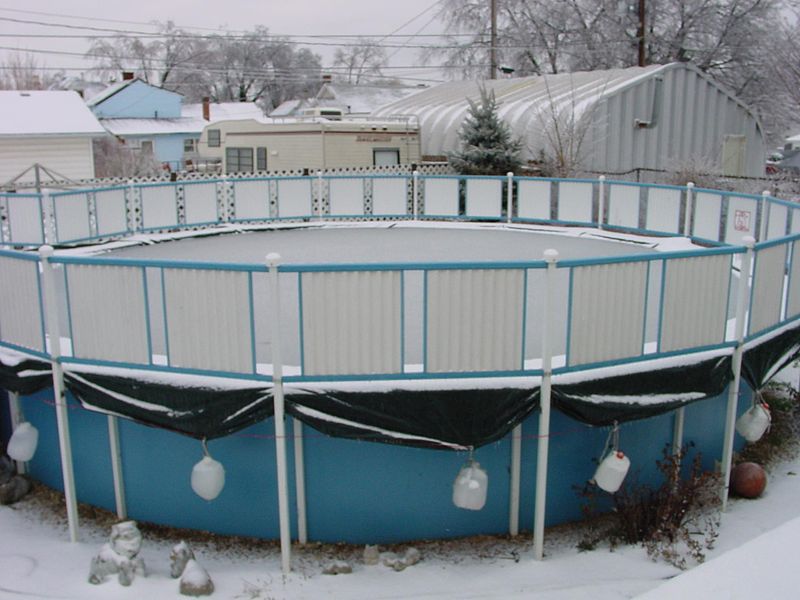


Once a pool is properly closed, you can rest easy knowing everything will be fine once you’re ready to reopen. And by properly winterizing your pool, and not leaving it open and unattended, you save yourself a lot of work.
Of course, you might have to do a bit of skimming, vacuuming, and chemical balancing.
IF you added winterizing chemicals, then restoring the water level and powering the pool system back on comprises most of the work.
So far, we’ve really only discussed the advantages of closing your pool for the season. But these next few reasons revolve around everything that can go wrong if you don’t close your pool when it needs to be closed.
Brace yourself, it isn’t pretty. But by the end, you’ll see why closing your pool is a good idea.
Pool damage
If you have an above ground pool, then adding an air pillow and cover is essential.
Although the frames of above ground pools are made to withstand high amounts of pressure, a layer of ice can change things. Without an air pillow, the frozen water in the pool forces the pool frame to overexpand, causing it to crack or even collapse.
[How To Winterize Your Above Ground Pool In 7 Simple Steps]
And if you have an inground pool, failing to properly close off the pool plumbing can lead to pipe damage, which we’ll be discussing later.
Pump damage
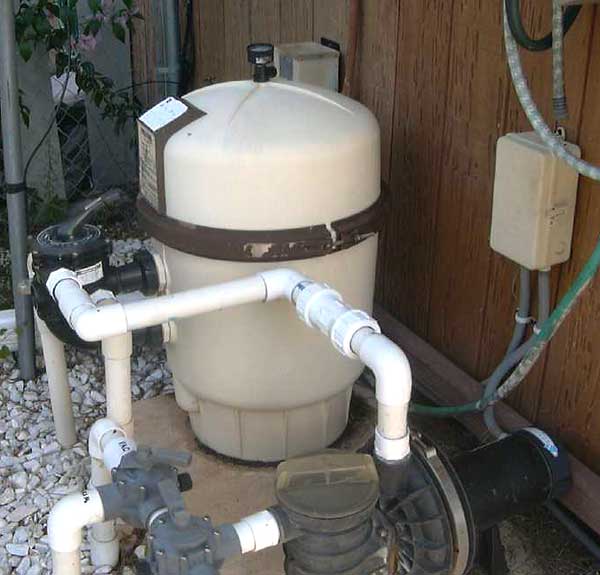


Aside from your pool taking damage, there’s also the risk of damaging your equipment. Specifically, your swimming pool pump.
A pump that isn’t emptied out and properly winterized can experience freeze damage. The type of freeze damage that cracks the pump housing and breaks the motor.
Luckily, winterizing a pool pump is as simple as removing the drain plug(s). This prevents freeze damage.
Filter damage
Much like your pool pump, your filter can suffer a similar fate when it comes to freeze damage.
And depending on what type of pool filter you’re using, there’s also the added risk of damaging your filter media. Another expense.
So to avoid damaging the housing of your pump, your pressure gauge, or your unions, remove the drain plugs at the bottom of the filter housing. Also, remember to use the pressure release valve at the top of the filter to let out trapped air.
Heater damage
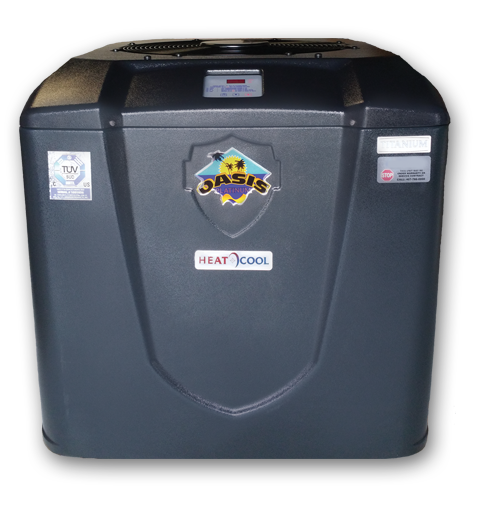


Unless you’re in a warmer climate where you can run your heater throughout the offseason, properly winterizing your pool heater is a must.
Especially since you have a lot more to lose if your heater is damaged. From burst heat exchangers and broken sensors to cracked housing and PVC plumbing. Not to mention potential damage to expensive internal components, like the compressor and fan motor.
To properly winterize a pool heater, remove the drain plugs at the bottom of the unit, disconnect the inlets/outlets, and blow air through the pipes to remove any leftover water.
Pipe damage
Whether you own an inground or above ground pool, pipe damage is something you’ll want to do your best to avoid.
If you damage the pipes in an above ground pool, then you’ll have to spend money to replace them. Not to mention the added time it’ll take to reinstall them later.
And if you own an inground pool, then it can get even more complicated. Since half of an inground pool’s plumbing is located underground, freeze damage can be even more severe. Underground burst pipes are no fun to deal with, and they’re a headache to repair.
So, like much of the other winterization tips, the best step is to blow out the pipes and drain them. The goal is to get any lingering water out, that way, freeze damage isn’t possible,
Damage to deck
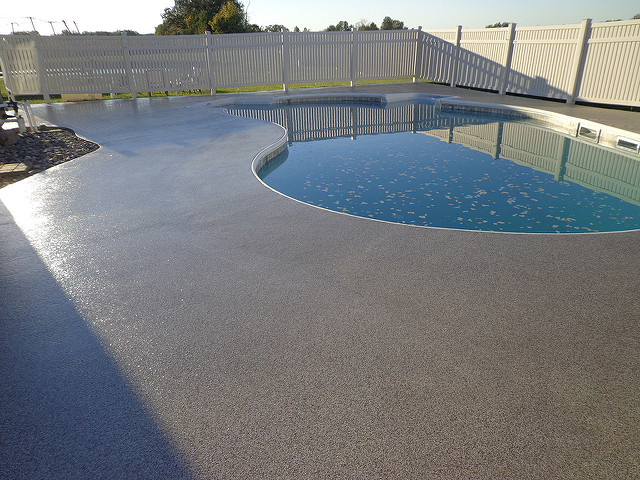


This is more for the inground pool owners, as above ground pool owners (usually) don’t have to deal with underground pipes.
But here’s something to consider: when underground pipes burst, they moisten the soil around them. Over time, as water flows out of the broken pipes, erosion starts to take place. When this happens, the dirt holding the decking up begins to wash away, causing the foundation of the concrete to undergo a lot of stress.
Sometimes enough stress to crack the deck open. Something you don’t want to have to repair.
Closing thoughts
Unless you’re in a warmer climate, deciding to close your pool for the season is the best choice you can make, both for your wallet and your peace of mind. By winterizing your pool, you avoid the major risk of freeze damage. You also save a bunch on chemical and energy costs.
If you liked this post, you might also like:

